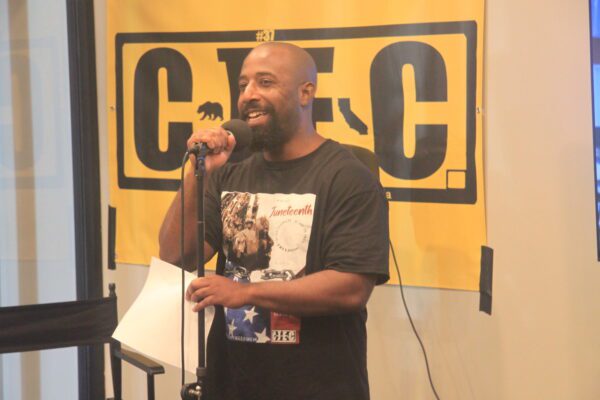
By Edward Henderson, California Black Media
The Coalition for a Just and Equitable California (CJEC) is a statewide organization comprised of various associations, community groups and individuals united by their commitment to fight for reparations and reparative justice for the descendants of enslaved Black American men and women.
CJEC was one of seven “anchor organizations” sanctioned by the California Reparations Task Force and the California Department of Justice (DOJ) to evaluate California’s role in slavery and Jim Crow discrimination. They also aided in developing resolutions to compensate African Americans in California for past and ongoing race-based injustices.
California Black Media (CBM) recently interviewed Chris Lodgson, the lead organizer and advocate for the CJEC to discuss the organization’s achievements, challenges, and plans heading into the new year.
Responses have been edited for length and clarity.
Looking back at 2024, what stands out to you as your most important achievement and why?
The fact that we helped to advance the first ever state level lineage-based reparations related legislation this year is probably the biggest success. At the start of the year, we introduced the first ever bill specifically for residents who were descendants of people who were enslaved in this country.
Also, state agencies across the state of California started collecting what we call lineage data. Now, specifically state employees or people who want to become state employees, have the option to self-identify as Black Americans who are descendants of people who were enslaved in this country. That is based on some legislation that we wrote in 2022 that the Governor signed. It took effect this year.
How did your leadership and investments contribute to improving the lives of Black Californians?
California took steps to recognize and identify residents who are these descendants. I think that is a positive impact on Black Californians because for the first time ever we are being seen.
We have a saying: ‘if you don’ t see a community you can’ t serve a community’.
What frustrated you the most over the last year?
Several of the bills that we supported this year were blocked. And then also one of one of the other bills that we supported this year was vetoed.
Secondly, the actions of the California Legislative Black Caucus not just in blocking the bills, but how they didn’t work with each other.
What inspired you the most over the last year?
How people across the state of California — and across the country, really — have been able to come together in support of the reparations effort. Grassroots advocates and organizers and supporters of reparations generally have been able to work together, especially after the events over the last several weeks with the bills being blocked. Also, the national attention that we are getting has also been inspiring.
I’m also really impressed with and inspired by how much our folks are getting involved in the political work, and how much we’ve matured politically. We really have been caring more about elected leaders’ policies rather than what their political parties are.
What is one lesson you learned in 2024 that will inform your decision-making next year?
One lesson that we learned is that if Black legislators are working against each other, which is what we saw this year, that will hurt reparations. I know that this year we had Black legislators working against other Black legislators and that hurt the effort. As advocates for reparations, we must work to build more political power, specifically in areas where we would like influence over the members who represent those areas.
In one word, what is the biggest challenge Black Californians face?
Power. Political power specifically.
It became very, very clear when the Black Caucus introduced those bills that they call reparations bills. An apology is not reparations. Bringing back affirmative action is not reparations. Letting people wear their hair the way they want to at work is definitely not reparations.
To me, that was a clear sign of political weakness.
What is the goal you want to achieve most in 2025?
The passage and enactment of actual reparations legislation. That is the number one goal. That includes bills and policies that we didn’t get this year and other things that we want.


